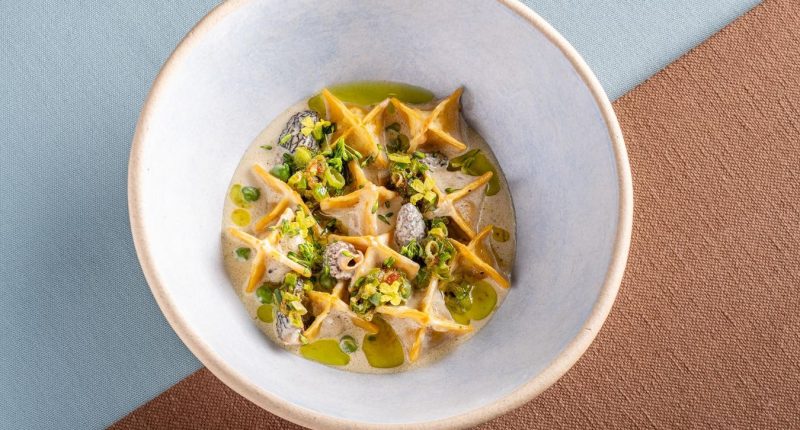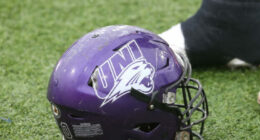Share this @internewscast.com
Rabbit shish barak at Albi in Washington D.C.
REY LOPEZ PHOTO
A beloved Washington D.C. restaurant is back in business, following a short hiatus to spruce up and re-envision the lauded eatery.
Albi, the Michelin-starred restaurant from Chef Michael Rafidi (named James Beard Foundation’s 2024 Outstanding Chef), reopened in early April, with a new experience, menu, and design rooted in the chef’s Palestinian heritage.
“The inspiration is for Albi to express my personal journey with cooking, and with how food connects us to our past. It’s a way to interpret the experience of growing up eating Palestinian food, but not surrounded by the backdrop of the Arab world,” Rafidi says. He grew up in Maryland, enjoying Mid-Atlantic staples like blue crab and sweet corn, and Middle Eastern cuisine. Professionally, he spent most of his career cooking French and New American food.
Kibbeh Naya with Shenandoah Lamb at Albi in Washington D.C.
REY LOPEZ PHOTO
“I realized that if I were ever to open my own restaurant, in order for it to feel authentic, I would need to put something more personal on the plate. And so the name became Albi, my heart,” Rafidi says.
Albi opened in early 2020, a perilous time for any new business to kick off. Now, with plenty of accolades and acclaim, Rafidi is staying true to his vision, with a restructured à la carte dinner menu (think coal-roasted oysters in arak butter and wood-fired pita topped with crab and spring veggies), and an evolved take on the restaurant’s signature $165 Sofra experience: a spontaneous, five-course family-style dinner shaped nightly by seasonality and dialogue with guests.
“Some of the dishes are really personal to me,” Rafidi says. “Sfeeha is something that I grew up eating in my grandparents’ kitchen, and I think that every Arab family has deep ties to the idea of sitting around a big plate of Warak Dawali [stuffed grape leaves], so those are always really important to me. I’m really excited about newer additions where we’re digging deeper into Palestinian cooking traditions: Shish Barak [dumplings], and Maqluba [an upside down rice] made with crab in our version instead of the traditional chicken). It’s not an exaggeration to say that I’ve been trying to figure out the right way for us to present Maqluba for years, so it’s really exciting to see it on the menu and on tables now.”
Knafeh, a dessert at Albi in Washington D.C.
REY LOPEZ PHOTO
In presenting these traditional dishes created with elevated technique and premium ingredients, Rafidi says he’s hoping to move the conversation on what “cuisine” is and what Levantine food can be. “There’s this automatic assumption that certain styles of cooking fall under the term cuisine and others are relegated to being ethnic food,” he says. “There are a number of really great restaurants in D.C. proving that other cooking traditions are worthy of attention and admiration, and it’s my hope that Albi can always be part of that discussion.”
Albi’s new space was designed by Klein Agency, and offers three architectural “chapters” for guests to enjoy: the newly added Saha Cocktail Lounge, a central bar room, and an open, fire-lit dining room anchored by Albi’s hearth table. Details include original hand-embroidered works by Palestinian-American artist Jordan Nassar, whose pieces are held in the collections of the Whitney Museum in New York and ICA Boston.
The Saha Cocktail Lounge at Albi in Washington D.C.
Hawkeye Johnson
“We want guests to be excited about their experience, maybe even to leave more excited than when they arrived. We’re trying to do things with refinement and with purpose, so we want there to be an element of polish, but we want to keep a certain energy and lightheartedness,” Rafidi says. “We know we’re exposing people to new things, new flavors, new wines, new ideas about how cocktails are built, but we don’t ever want people to feel like we’re teaching them, even if they do learn something. We want to just present things to people in a way that they feel like they’re discovering something, because in reality they are. It’s one thing to hear something, but it’s another entirely to experience it, and that experience is more personal, more of an ‘aha’ kind of thing.”
Even for those who grew up with Levantine cooking, Rafidi sees Albi as a proxy to a distant homeland, via taste memory and collective experience.
“There are long, historical traditions in Palestinian cooking and those traditions are central to a sense of identity. Palestinian culture is rooted in the land and so are its cooking traditions. And when so many people are physically separated from that land, our food can help to bring us back.”
Albi is located at 1346 4th Street SE in Washington, D.C., and is open for dinner service Tuesday through Sunday from 5–10 p.m., with reservations available via Resy.






